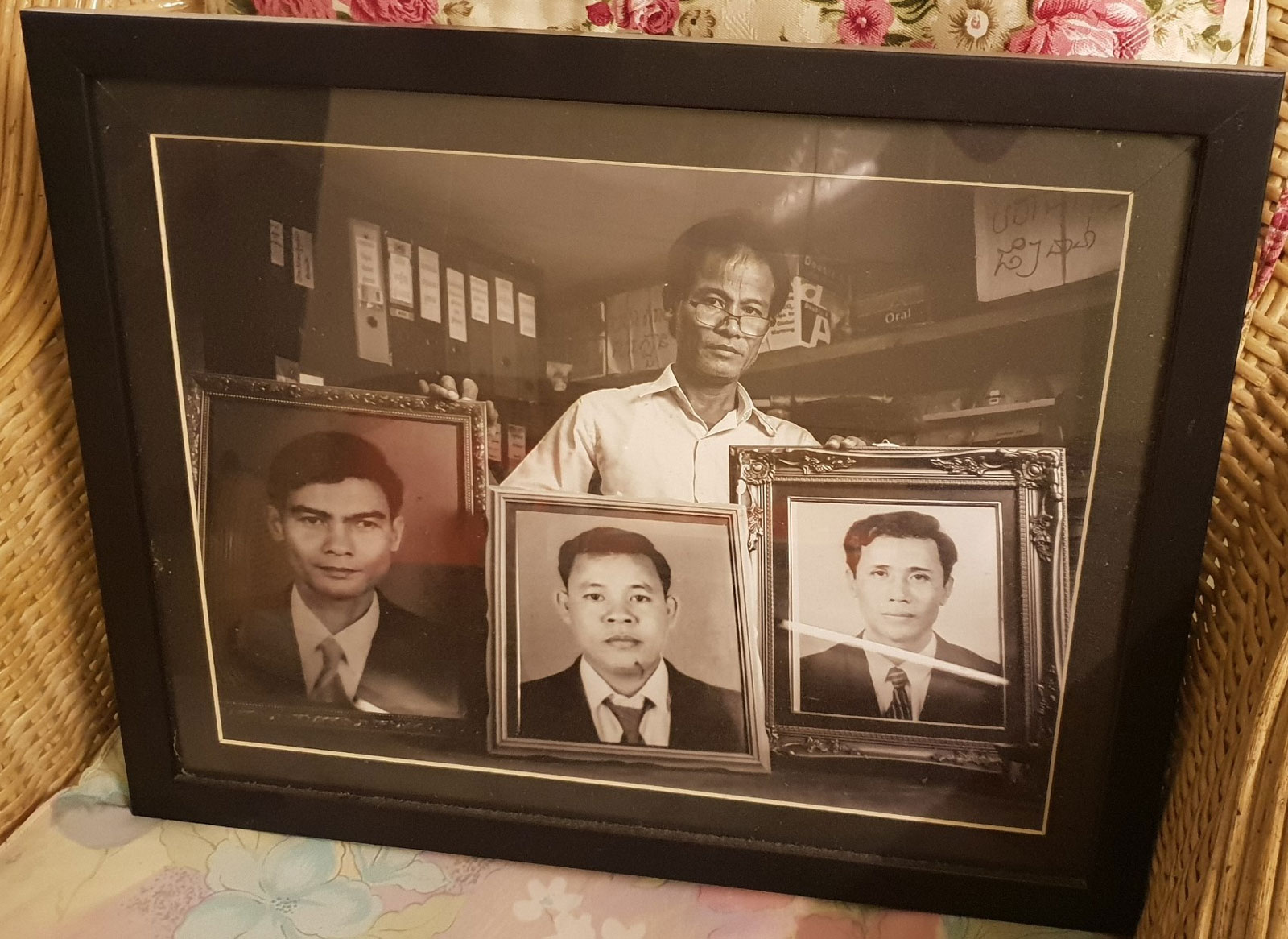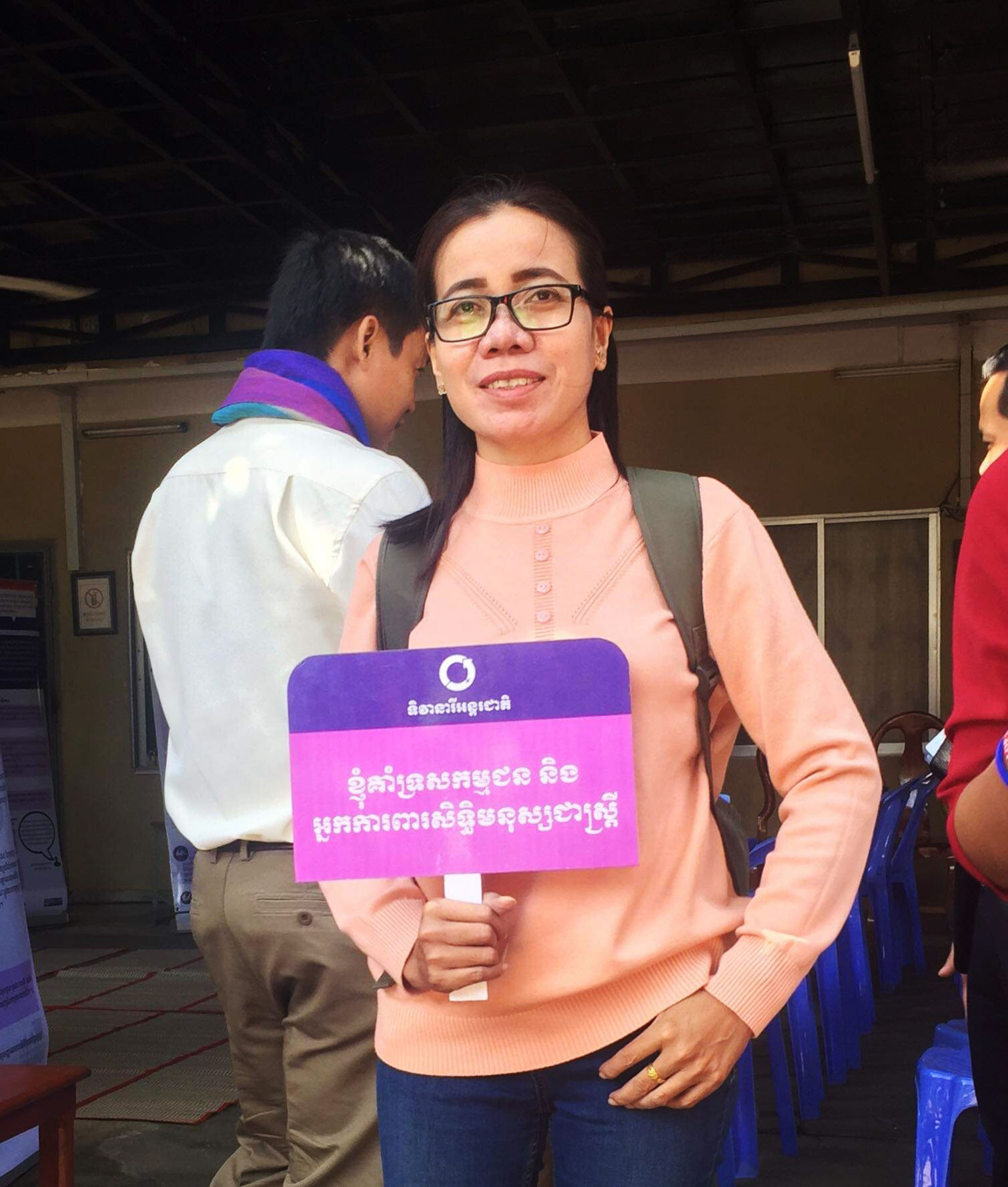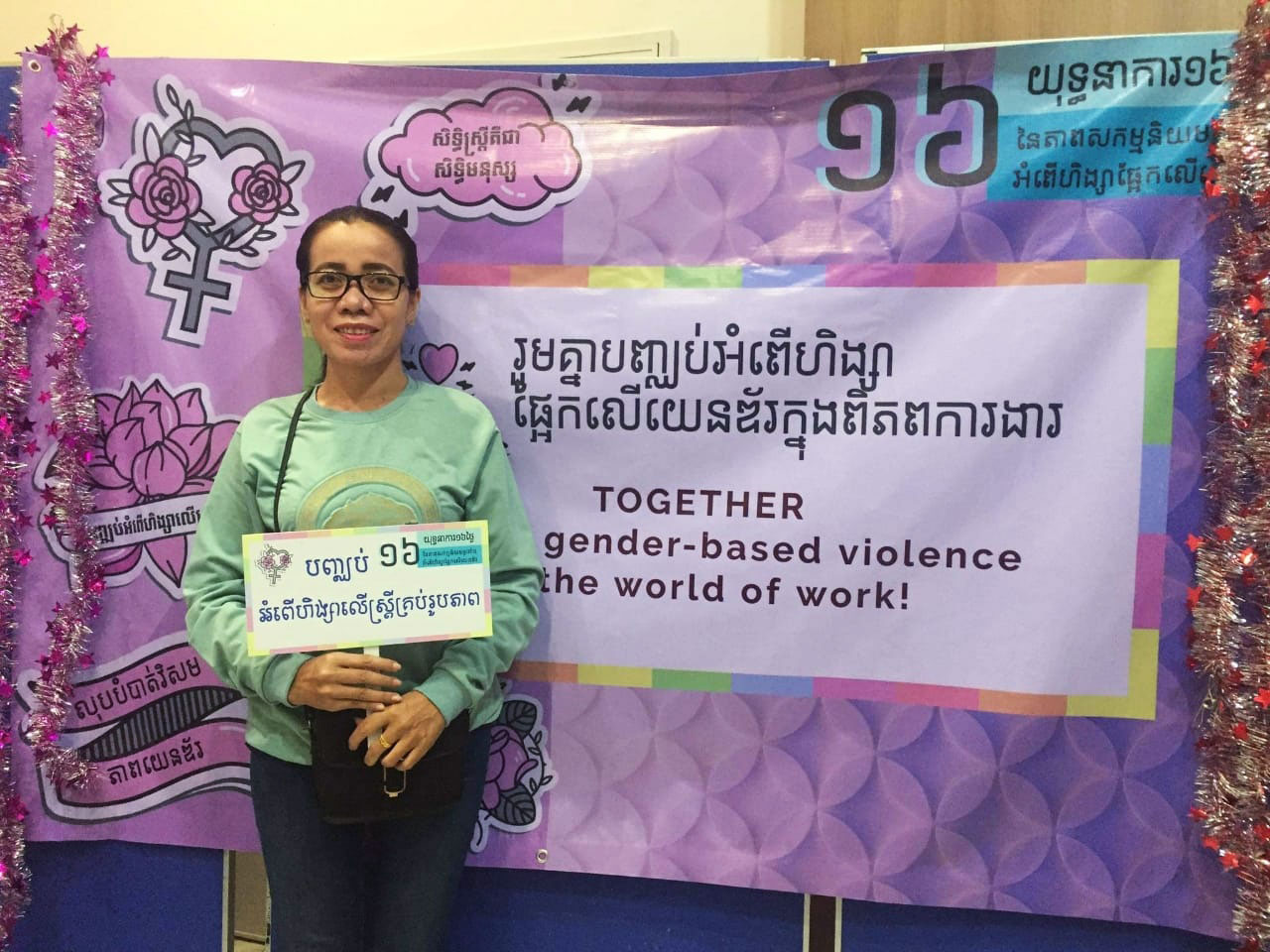Say Sokny will always remember her first day of work for Cambodia’s Free Trade Union.
“When I came to this office,” she recalled, standing in the large, messy room in Phnom Penh where the union’s operations take place, “my legs were shaking. Shaking because I was a little girl, a small body, from the province. And I saw, with my own eyes, Chea Vichea’s blood.”
Chea Vichea, the Free Trade Union’s founding president, had been murdered just a few weeks earlier, in mid-January of 2004: shot three times at point-blank range in the head, arm and chest as he stopped by a newsstand in Phnom Penh to buy his morning paper. His killers have never been found, and the murder is presumed to be politically-motivated.
The Free Trade Union of the Workers of the Kingdom of Cambodia was set up in 1996, with the help of opposition leader Sam Rainsy, to represent workers in Cambodia’s fledgling garment industry. In the weeks after the shooting, Sokny volunteered to help the union translate the “uncountable” number of letters of solidarity flooding into the union office from all around the world. Many of the union’s staff had fled Cambodia, fearing for their own safety, and the office was often empty. Sokny, then just out of high school, worked alone, in a place that was stained with Vichea’s blood both literally and figuratively.
“And it was smelly, so smelly,” she remembers. “It smelt bloody at the office. And I felt so scared.”
Everything But Arms: trade for development?
It has never been easy being a unionist in Cambodia. This perhaps explains why Cambodia’s union women have mixed feelings about the European Commission’s decision, announced last month, to partially suspend Cambodia’s inclusion in its Everything But Arms trade deal. The EBA initiative was designed to promote development in the world’s poorest countries, permitting duty-free, quota-free exports to lucrative EU markets for Cambodia and 48 other Least Developed Countries.

A clause in the agreement binds beneficiary governments to upholding human and labour rights. Yet for Sokny and her colleagues, it seems as though the EU has merely looked on as fundamental freedoms have been eroding in Cambodia since 2001, when the EBA was introduced.
The period around Vichea’s death in 2004 was a particularly grisly time in the history of the Free Trade Union. Two months before his murder, another Free Trade Union activist, Yim Ry, was shot dead by police at a demonstration outside a garment factory in Phnom Penh. Five months later, Ros Sovannareth, a factory union leader, was killed; a fourth, factory leader Hy Vuthy, was murdered in 2008.
So when Sokny thinks about the protections outlined in the EBA, she is less than impressed.
“What have we got in 20 years? Four dead,” she said. Today, photographs of these fallen comrades stare down from the walls of the union’s office.
Physical violence is not the only threat facing unionists – harassment and intimidation waged through Cambodia’s legal system is also commonplace. Since 2008, explains Sokny, the government has used the courts “as a tool”.
“Almost everyone in my office is under court supervision. Almost all of them. We cannot do anything. It seems like all of our activity has been criminalised,” she said.
The Veng Sreng case is one example of how unionists are treated under the Cambodian criminal justice system. Five striking workers are believed to have been killed by police following large protests along Phnom Penh’s Veng Sreng Boulevard on January 3, 2014. To date, no police officer has been prosecuted for these deaths, but courts convicted six union leaders for their alleged roles in instigating the violence. Although all have since been acquitted following international rebuke, these convictions weigh heavily on unionists.
If political freedoms have lagged under the EBA’s watch, so too has social development. The narratives of an economic miracle that emanate from national markers of the garment industry’s growth – 708 factories, 660,000 workers, and $9.4 billion of exports in 2018 – largely evaporate on the ground.

“I did not plan to work as a unionist, but I saw so much injustice that the workers faced.”
Chheng Danou
Across town, it is something that Chheng Danou understands better than most. Now the General Secretary of the National Independent Federation Textile Union of Cambodia (NIFTUC), which represents 100,000 garment workers, Danou has risen to her present post from the union’s rank-and-file membership. She spent 17 years working in Cambodia’s garment factories, starting in 1998 at the age of 23, and knows firsthand the challenges of working in a sector marred by austere living and working conditions.
Inside the factory, Danou and her colleagues were employed on a piece-rate basis, paid according to how much they could sew.
“I was exhausted,” she recalls, “but we had to struggle all together.” When she entered the factory in 1998, Danou was shocked at the verbal abuse levelled by workplace superiors. By the time her factory career ended, she had heard it so often she “regarded it as normal”.
So Danou joined the union to help overturn these problems. “At that time I did not plan to work as a unionist,” she explained, “but I saw so much injustice that the workers faced.”
The work of union women like Danou, many of whom have intimate experiences with the underbelly of the garment industry, has kept progress moving – but change has been frustratingly slow for them.
A minimum wage rise of 137.5% between 2013 and 2020, delivered on the back on the Veng Sreng protests, looks promising on paper but has been quickly swallowed by consumer inflation, ever-rising rents and a new scourge: microfinance.
As a result, few workers have been able to accrue savings or make investments in a cruel sector that burns out bodies and throws out its employees when they can no longer meet the exacting demands of intricate and fast-paced production lines – often when they reach about 35 years old, according to Danou.
Both Danou and Sokny are sceptical about the benefits that EBA has brought workers. “You know,” Sokny insisted, “EBA injects powerful and rich people only. EBA doesn’t really help the poor.”
These discrepancies spur their ongoing drive to help Cambodian workers win a fairer deal. “We want equality,” Sokny underlined.
Sanctioning who?
It is now workers who stand to lose most from the European Commission’s decision to partially revoke the EBA, on the grounds that “the duration, scale and impact of Cambodia’s violations … left the European Union with no other choice.” So far, Cambodian Prime Minister Hun Sen has refused to “bow down” to what he describes as politically-motivated foreign demands.
Yet amid the sparring of strongmen and superpowers – in which the struggle over EBA is often seen as part of a wider war for Cambodia’s soul between the West and an ascendant East – it is often overlooked that this is a battle that will play out on everyday terrain: in the working and home lives of Cambodia’s garment workers.
Once the European Commission’s recommendations are ratified by the EU Parliament, the block will place tariffs on certain Cambodian products from August 2020 onwards, designed to hit 20% of Cambodia’s EU exports. A slice of goods worth $1.1 billion dollars per year will now be subject to tariffs ranging from 5% to 16%. The affected products are set to include all travel goods and specific clothing and footwear items.
Of the 660,000 garment and footwear sector employees in Cambodia, 90% are women. The potential impacts on this vulnerable group have turned the geopolitics of this trade deal into an issue of urgent international feminist concern.
In Cambodia, factories are “almost exclusively” foreign-owned and can quit the country at alarming speed if the going gets tough – as workers as the Yu Fa factory found out in 2018, when their Taiwanese owner shut down the factory and fled whilst they were attending one of the Prime Minister’s speeches.
Since deliberations over the EBA’s future in Cambodia were announced last year, the Cambodian government has introduced several new measures to help investors offset the potential costs and retain enterprises. Many of these involve production savings secured at workers’ direct expense, making workers already worse off under the new tariff regime – before it has even been introduced.
Last year, for example, the government cancelled six public holidays. It might seem like a trivial issue but, as Danou explained, workers are entitled to double pay on holidays. Thus, “it helps to increase the profit of the company or factory,” she surmised, “but workers lose out.”
This year, the government is proposing to cut mandatory overtime rates for night shifts, currently set at 130% of regular pay. For women with family at home especially, this axes much of the benefit to these shifts.
When tariffs kick-in this August, Danou thinks factories are likely to follow suit in finding ways to leverage productivity savings by passing costs on to workers. According to Danou, the union has received news from several factories that their production targets are increasing – effectively another wage cut. The incentives offered to factories so far have been such a “gift” to factories, argued Sokny, that, for now at least, “they are happy enough without EBA.”
However, worse may be yet to come. Some union women believe the cost-cutting measures might not be enough to continue to entice investment. Thanks to the ILO’s Better Factories programme, which monitors the quality of all export factories, Cambodian clothing and footwear products have always been delivered with an institutional rubber stamp of ethical standards. The EBA decision challenges the ethical credentials that local industry has cultivated, and some have concerns that the reputational risk this discrepancy could pose to brands might complicate things further.
“Once buyers know this country violates human rights, they may not purchase orders from Cambodia,” said Ken Chheng Lang of the Confederation of Cambodian Workers Movement, another woman who has risen from grassroots organising as a factory worker to an executive of a national union.
Global brands have taken notice. Following the announcement of the EBA withdrawal last month, the Swedish corporation H&M pledged to “further evaluate how the EU’s decision will impact our business and production strategy in Cambodia.”
Most agree that it’s still too early to assess the final impact of the partial EBA withdrawal on factories. Still yet, employers and the government “might find a way to solve it,” hopes Danou. “However, if they don’t find a solution, I think there will be many factories facing closure.”

Chheng Lang estimates that around “forty to fifty thousand” workers might lose their jobs.
Um Dina, General Secretary of the Coalition of Free Trade Union of the Woman’s Textile, explained the anxiety and panic this is causing among garment and footwear workers: “The government said Cambodia will learn to live by itself. But the problem is that workers are those who will suffer hardship.”
The EBA “is not a sanction on the government,” Danou stressed. “It impacts only on the workers.”
Leveraging withdrawal
Although they are concerned about the impact of the EU’s decision on workers, unionists are unanimous in stressing the onus is now on the government to respond to the EU’s criticisms. However, there is little optimism that the withdrawal of 20% of the Kingdom’s free-trade privileges will be enough to force the government’s hand.
Here, there is a palpable sense of frustration with the EU for talking big but failing to deliver – that after twenty years of democratic backsliding, the partial EBA withdrawal is simply too little, too late.
“I want them to make a quality result, a quality resolution for my country, for my people, for the democracy we have sacrificed our lives for,” Sokny explained.
In the current climate of harassment, intimidation and fear, the union movement’s ability to organise national mobilisations to press for change, as seen in the past, is severely curtailed. The workers, Sokny says, “will tell you they are afraid. They will not go to take the road again, to demonstrate again. They are scared to God to be killed like them at the Veng Sreng shooting.”
But amidst the apprehension, there are glimmers of hope. Dina points to how brave some of the union folks and garment workers are, especially the women – some have gone so far as to make blatant requests for change on the Prime Minister’s Facebook page.
These small acts of courage give Sokny mute grounds for optimism that workers may yet prove a greater force than some predict in leveraging change and winning the rights and rewards denied to them, both under the EBA and following its partial withdrawal.
“I think the anger of the Cambodian workers at the factory can ignite the problem. One day, there can be unrest. … Do you want more of us to die? I don’t want that. Only the workers, when they rise up, [will create] unrest, social unrest in Cambodia.”
This article has been researched and written as part of our Recognising Resilience campaign. Read more stories here.

